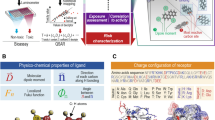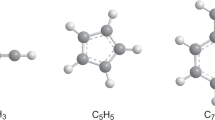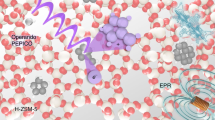Abstract
SEVERAL lines of evidence have strongly implicated the bay region anti-diolepoxide of benzo(a)pyrene (BP) (Fig. 1) as the principal metabolically activated form of this potent environmental carcinogen1. A bay region is defined simply as a molecular region such as the 4,5-positions of phenanthrene. Recent studies indicate the bay region diolepoxides of 3-methyl-cholanthrene (3-MC) (refs 2, 3), benz(a)anthracene4,5, 7-methylbenz(a)anthracene (MBA) (ref. 6), 7,12-dimethylbenz(a)-anthracene (DMBA) (refs 7, 8), and dibenz(a, h)anthracene9 as the ultimate carcinogenic forms of these hydrocarbons. (In the cases of 3-MC, 7-MB A and 7,12-DMBA there is evidence for an additional benzylic hydroxyl group.) Jerina and Daly10 suggest, on the basis of simple molecular orbital calculations, that the bay region diolepoxides of carcinogenic polycyclic arenes are generally distinguished by exceptional reactivity and are the ultimately active forms of this class of carcinogen. We report here evidence for metabolites other than bay region diolepoxides as the active forms of at least some carcinogenic hydrocarbons.
This is a preview of subscription content, access via your institution
Access options
Subscribe to this journal
Receive 51 print issues and online access
$199.00 per year
only $3.90 per issue
Buy this article
- Purchase on Springer Link
- Instant access to full article PDF
Prices may be subject to local taxes which are calculated during checkout
Similar content being viewed by others
References
Harvey, R. G. & Fu, P. P. Polycyclic Hydrocarbons and Cancer: Chemistry, Molecular Biology and Environment (eds Gelboin, H. V. & Ts'o, P. O. P.) (Academic, New York, in the press).
King, H. W. S., Osborne, M. R. & Brookes, P. Int. J. Cancer 20, 564–571 (1977).
Thakker, D. R. et al. J. am. chem. Soc. 100, 645–647 (1978).
Wood, A. N. et al. Proc. natn. Acad. Sci. U.S.A. 74, 2746–2750 (1977).
Slaga, T. J., Huberman, E., Selkirk, J. K., Harvey, R. G. & Bracken, W. M. Cancer Res. (in the press).
Malaveille, C., Tierney, B., Grover, P. L., Sims, P. & Bartsch, H. Biochem. biophys. Res. Commun. 75, 427–433 (1977).
Moschel, R. G., Baird, W. M. & Dipple, A. Biochem. biophys. Res. Commun. 76, 1092–1098 (1977).
Ivanovic, V. et al. Cancer Lett. (in the press).
Karle, J. M., Mah, H. D., Jerina, D. M. & Yagi, H. Tetrahedron Lett. 4021–4024 (1977).
Jerina, D. M. & Daly, J. W. Drug Metabolism (eds Parke, D. V. & Smith, R. L.) 13 (Taylor and Francis, London, 1976).
Jerina, D. M. & Daly, J. W. Science 185, 573–582 (1974).
Shear, M. J. Am. J. Cancer 36, 211–228 (1939).
Miller, J. A. & Miller, E. C. Cancer Res. 23, 229–239 (1963).
Pataki, J., Duguid, C., Rabideau, P., Huisman, H. & Harvey, R. G. J. med. Chem. 14, 940–945 (1971).
Newman, M. S. & Hung, W. M. J. med. Chem. 20, 179–181 (1977).
Author information
Authors and Affiliations
Rights and permissions
About this article
Cite this article
HARVEY, R., DUNNE, F. Multiple regions of metabolic activation of carcinogenic hydrocarbons. Nature 273, 566–568 (1978). https://doi.org/10.1038/273566a0
Received:
Accepted:
Issue Date:
DOI: https://doi.org/10.1038/273566a0
This article is cited by
-
Tumor-initiating activity in mouse skin and carcinogenicity in rat mammary gland of fluorinated derivatives of benzo[a]pyrene and 3-methylcholanthrene
Journal of Cancer Research and Clinical Oncology (1988)
Comments
By submitting a comment you agree to abide by our Terms and Community Guidelines. If you find something abusive or that does not comply with our terms or guidelines please flag it as inappropriate.



